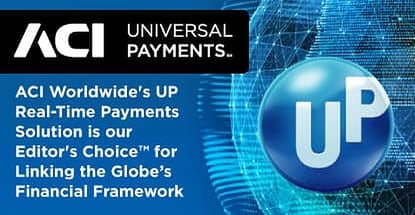In a Nutshell: Currencies used to pay for goods and services have evolved over the years. Modern Society’s contribution to financial history books is a cashless society that depends on plastic cards and cellphone signals to make payments. Complex software systems make that possible by managing the security that keeps credit and debit systems safe, fast, and reliable. ACI Worldwide has maintained a majority of those global systems for more than 40 years. ACI’s real-time electronic payment solutions manage the liquidity of businesses, corporations, and governments around the world. The company’s Universal Payments (UP) real-time payment solution is used by 18 of the top 20 global banks and more than 300 retailers. The company’s electronic bill payment solutions manage customer accounts for more than 4,000 organizations. //
Consumers have used interesting currencies since the dawn of man to pay for the goods and services they need. Ancient traders employed items like seashells, stones, and even squirrel pelts to perform daily transactions.
Thankfully, we no longer have to keep a collection of animal skins folded in our back pockets to pay for things.
When future historians study our modern payment methods, they may find them equally strange. The swipe of a plastic card or the wave of a cellular phone moves money at the speed of light in our increasingly cashless society. Real-time online payments let shoppers make a purchase and send funds across the world in the time it takes to tap the Enter key on their keyboards.
Worldwide consumer spending habits are dominated by electronic payments — and business is good. More than $6 million in US funds is spent each minute via online or in-person retail transactions. A paltry 11% of spenders say that cash is their preferred method of payment, with the rest leaning toward electronic options like credit and debit cards.
Trillions of dollars change hands worldwide every day without actually touching hands. A country’s entire economy can depend on the security and speed of the transactions it executes. One company has been trusted for more than 40 years to provide these secure and reliable, real-time payment solutions to companies, banks, and governments across the globe.
ACI Worldwide powers electronic payments and banking for more than 5,100 financial institutions, intermediaries, retailers, billers, and processors globally. The company helps manage the cash flow and liquidity for 18 of the top 20 banks worldwide and over 300 of the world’s leading retailers. More than 4,000 organizations use the company’s electronic bill payment solutions to manage customer accounts.
ACI executes payments and securities transactions that total more than $14 trillion each day, which sets the company far apart from its competitors. Roughly $13 trillion worth of those transactions go through an application the company calls the Money Transfer System (MTS).

“The solution is installed in many of the larger American banks and processes their Fedwire and Chips wire payments on a daily basis,” said Barry Kislingbury, Director of Solution Consulting for Immediate Payments at ACI Worldwide.
ACI software provides organizations with end-to-end enterprise payment capabilities, accelerating time to market, reducing risk, growing revenues, and controlling costs. Universal Payments (UP) enables real-time, any-to-any payments that reduce the risk of chargebacks with an instant transfer of funds and fast settlements that range from instant hours to next day.
“We support just about every type of electronic payments — from providing solutions to the merchants and corporate on the front end and solutions and processes in the middle to solutions for banks and corporates in the back end,” Barry said. “We also cover fraud, e-commerce and just about everything else in payments.”
Executing $14 Trillion Daily Global Financial Transactions
The ACI systems not only handle tremendous volume from the number of transactions it deals with every day, but it also has a magnifying glass put on its security features at all times.
“Because of the high value of transactions processed by ACI systems, this makes ACI systemically important to the US economy,” Barry said. “We’re audited by Federal regulators several times every year because of that, which adds an awfully large layer of security that we have to add to everything we do — our laptops, computers, and cell phones. We get looked at through a very fine-toothed comb.”

Barry Kislingbury, Director of Solution Consulting for Immediate Payments at ACI.
The security measures ACI takes to protect its global client base attract new organizations and corporations to the company. The State Bank of India — one of ACI’s many government clients — used real-time software systems to install the nation’s largest network of ATM machines for its 75 million customers.
The bank’s initial installation of 4,000 ATM machines led to the issuing of 6 million Maestro-branded debit cards that can be used at 52,000 retail shops across India.
Aside from traditional banking functions, the cards allow students to pay exam fees to their university through the machines and lets mobile phone users top up their airtime at the ATM. Plans are underway to use ACI’s technology to allow Indian consumers to make government-related payments through the ATM.
Real-time payments have many benefits aside from speed. Traditional ACH transactions — like payroll, pensions, invoices, or check purchases — have slower processing times and risk being rejected from accounts with insufficient funds. Real-time payments provide savings to its clients in both time and money and helps future-proof a company’s liquidity system.
The company also boosts its clients’ liquidity by giving them access to funds within seconds of a transfer instead of waiting for days to claim money gained through traditional transactions.
“As we head toward that 24/7/365 real-time world, reliability becomes even more important,” Barry said. “All of the real-time, immediate payment schemes that I work on around the globe are always on, with very quick response times. We deliver immediate return on value.”
Barry said that he’s heard from some of ACI’s banking clients, which have used the company’s MTS software for more than 40 years and report they have never had a single moment of unplanned downtime. The company prides itself on the ability to function at all times without the need for banks to shut down to perform back-end updates to the UP software.
Banks also prefer the system because it gives retail clients and their customers an immediate execution of their transactions.
“With real-time payments, you get instant positive — or negative — confirmation that the payment has, or has not, been made,” Barry said. “It can help you manage your liquidity better and have far more control over your business.”
Connecting One-Sixth of the Planet in Real Time
Connecting different parts of the world on a stable and secure platform is no easy task. To meet the needs of its growing client base, ACI employs more than 4,100 employees through offices in 31 countries.
“We have a real-time payment solution that is now deployed in seven different countries,” Barry said. “As more countries come online, you’ll find that banks are having to connect to more and more country schemes, building real-time hubs. Several more countries will go live with real-time payments in 2018.”
Today, there are 21 live schemes globally with more in development. In November 2017, three major new schemes went live in Europe. The European Banking Association (EBA) that spreads across 33 countries, went live with Ream Time 1 (RT1); in the US, The Clearing House went live with Real-Time Payments (RTP) and Australia went live with New Payments Platform (NPP)
“This is just shy of 1 billion people who have gained access to instant payments,” Barry said. “That’s one-sixth of the planet.”
If you add that to the populations of India and China and the other live countries, then it’s more than half of the global population that can
now make an account to account instant payment.
40+ Years as a Global Payment Industry Leader
Credit and debit cards dominate the world’s preferred methods of electronic payment. Many ACI banking clients compete with those main payment methods by expanding the functionality of their current schemes and adding further payment options.
“The next evolution will be systems that sit on top of global payments,” Barry said. “The US now has a solution called Request for Pay (RfP), which is a service implemented over the new TCH RTP system, and countries like the UK that don’t have that are starting to implement it now.”
Barry compared Request for Pay to a hypothetical customer who is enrolled in a rewards program at their favorite store.
When the customer makes a purchase, instead of using his or her credit or debit card for payment, they can swipe their rewards club membership or another form of identity that is linked to the club membership — like your phone. Since the store already has the customer’s banking information from enrollment, an instant notice is sent to the customer’s bank requesting payment. A notification then goes to the customer’s phone asking them to confirm or deny the transaction. Once it’s confirmed, the money automatically leaves the customer’s account and is deposited into the store’s account.
“It’s a really simple user experience, plus the store gets its money instantly and doesn’t have to pay interchange fees,” he said. “Because it’s ultimately saving them money and improving their liquidity and cash flow, they’re likely to offer you more reward points so you’ll use it next time.”
These schemes are catching on as more retailers and corporations look for ways to cut costs while improving the customer experience. As client ambitions grow bolder, ACI — already a leader in the industry —continues to innovate new pathways to technological advances.
No matter where the future takes us, it has to be better than carrying around squirrel pelts to pay for your lunch.
Advertiser Disclosure
CardRates.com is a free online resource that offers valuable content and comparison services to users. To keep this resource 100% free, we receive compensation for referrals for many of the offers listed on the site. Along with key review factors, this compensation may impact how and where products appear across CardRates.com (including, for example, the order in which they appear). CardRates.com does not include the entire universe of available offers. Editorial opinions expressed on the site are strictly our own and are not provided, endorsed, or approved by advertisers.


![7 Best Credit Cards for Tax Payments ([updated_month_year]) 7 Best Credit Cards for Tax Payments ([updated_month_year])](https://www.cardrates.com/images/uploads/2020/01/Credit-Cards-for-Tax-Payments.jpg?width=158&height=120&fit=crop)





![11 Ways to Lower Your Monthly Bill Payments ([updated_month_year]) 11 Ways to Lower Your Monthly Bill Payments ([updated_month_year])](https://www.cardrates.com/images/uploads/2022/06/Ways-to-Lower-Your-Monthly-Bill-Payments.jpg?width=158&height=120&fit=crop)
